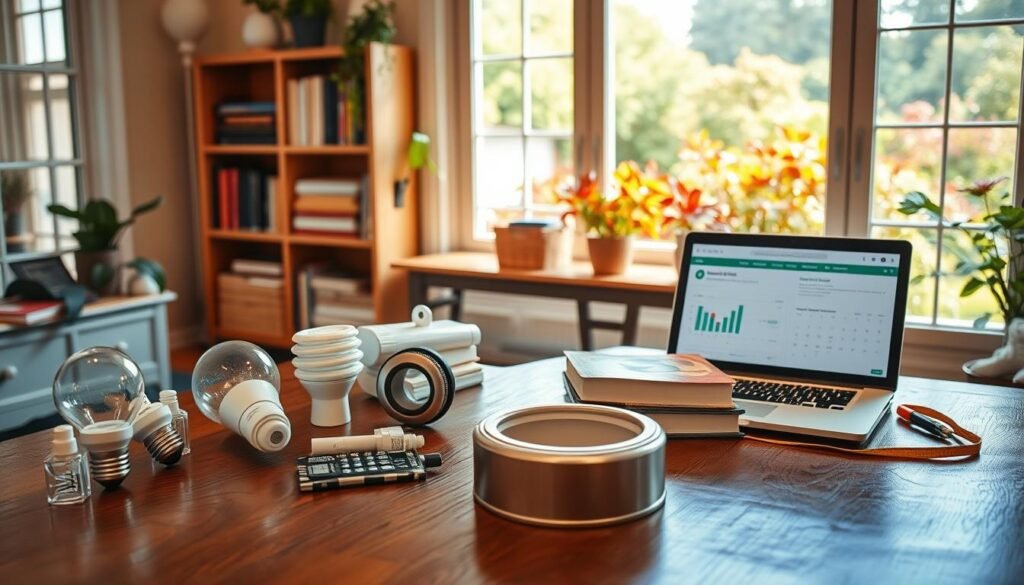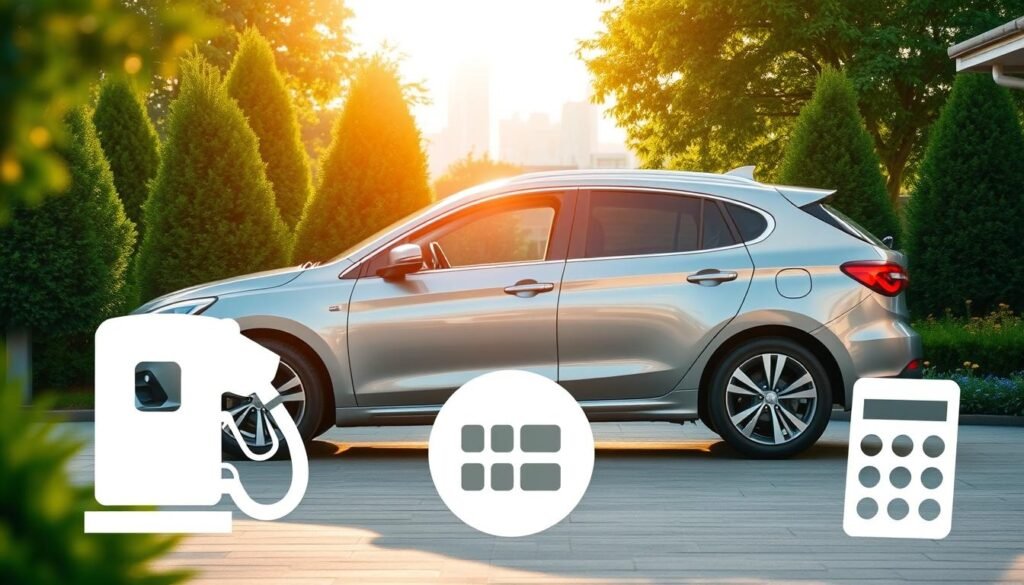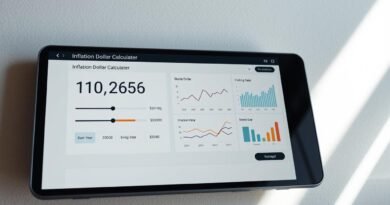UK Money-Saving Guide: Practical Tips to Stretch Your Budget
Did you know the average UK household spends over £3,000 a year on food? This shows how vital budgeting and cost management are. Whether you want to save for a big buy, pay off debt, or just handle everyday costs better, this guide has you covered. It’s packed with tips on saving money in the UK, from budgeting to smart spending.
Key Takeaways
- Average UK household spends over £3,000 yearly on groceries.
- Effective budgeting in the UK is crucial for financial stability.
- This guide covers various UK money saving ideas and cost-cutting strategies.
- The tips aim to help you manage daily expenses more efficiently.
- Learn how to save money in the UK without compromising your lifestyle.
Setting a Budget and Reviewing It Regularly

Creating a budget is key to good financial planning. Start by listing your regular income and essential costs like rent, bills, food, and transport. This lays the foundation for budgeting in the UK and ensures you meet basic needs first.
Next, think about what you can spend on fun things like going out and hobbies. Keeping an eye on these costs is part of money management strategies. It helps you keep control over your money. Click here
It’s important to regularly check your budget. Income changes or unexpected bills can throw off your plans. By reviewing your budget often, you can adjust to these changes. This helps you stay on track with saving goals. Here’s a simple guide to help you review your budget:
| Task | Frequency | Objectives |
|---|---|---|
| Income Assessment | Monthly | Verify regular and additional income streams |
| Expense Tracking | Weekly | Monitor ongoing spending on essentials and non-essentials |
| Budget Adjustment | Quarterly | Make necessary adjustments based on changing financial circumstances |
| Goals Review | Annually | Measure progress towards long-term financial planning tips |
Following these financial planning tips helps you keep track of your spending. Regular reviews are not just about tracking. They help you understand and adjust to your financial situation. This approach boosts your confidence in managing your money well.
Saving Money on Groceries

Groceries are a big part of our budgets. But, there are ways to spend less. Planning meals ahead is a good start. It helps you make a shopping list and avoid buying things you don’t need.
Choosing supermarket own-brand items can save a lot of money. They are often just as good as branded ones but cheaper. Buying in bulk also cuts costs. Don’t forget to use supermarket loyalty cards for discounts and rewards.
Buying seasonal produce is smart too. It’s cheaper and tastes better. This way, you save money and eat well.
Here is a table summarising cost-saving tips:
| Tip | Details |
|---|---|
| Plan Meals | Reduces impulse buys and food waste |
| Own-Brand Items | Cheaper alternatives to branded products |
| Buy in Bulk | Lower unit prices for bulk purchases |
| Loyalty Cards | Access to discounts and rewards |
| Seasonal Produce | Cheaper and fresher options |
Using these tips can really help with your grocery bills. It’s a way to save money and eat well. By making these changes, you can cut down on what you spend on food.
How to Save Money in the UK on Energy Bills

Keeping your energy bills low is all about being energy efficient. One of the best ways to save money in the UK is to switch energy suppliers. Use websites like Uswitch or Compare the Market to find the best deals.
Another smart move is to sign up for a fixed tariff. This locks in lower rates and protects you from price increases.
Lowering your thermostat by just one degree can also cut your heating bills. Using energy-efficient appliances and bulbs is another good idea. Choose A+++ rated appliances and LED bulbs for less energy use and longer life.
Simple habits like turning off lights and electronics when not in use help too. Sealing drafts around windows and doors also reduces energy consumption.
Here are some specific energy-saving actions and their potential benefits:
- Switch suppliers regularly: Access competitive rates.
- Use energy-efficient appliances: Lower energy consumption.
- Use LED bulbs: Reduce electricity costs.
- Draft-proof your home: Enhance heating efficiency.
- Turn off unused electronics: Save on standby power.
For a more detailed comparison, consider the table below, illustrating potential savings from implementing these energy-saving tips:
| Action | Average Annual Savings (£) |
|---|---|
| Switching Suppliers | 200-300 |
| Using Energy-Efficient Appliances | 50-100 |
| LED Bulbs | 20-50 |
| Draft-Proofing | 30-60 |
| Turning Off Electronics | 30-50 |
By following these money-saving tips UK, you can lower your energy bills and live more sustainably. Managing your energy use well can lead to big savings without losing comfort.
Reducing Motoring Costs

Lowering motoring costs is key to saving money on expenses and living frugally in the UK. Regular car maintenance is a big step. It keeps your car running well, saves fuel, and avoids expensive repairs later.
Looking for cheaper car insurance is another smart move. Compare prices and consider cheaper or multi-use policies. You might also save by choosing pay-per-mile insurance if you don’t drive much.
Driving more efficiently can also cut fuel costs. Drive at a steady speed, avoid idling, and plan your route to avoid sudden stops. Also, make sure your tyres are at the right pressure for better fuel use and safety.
Lastly, try to use your car less by combining trips or using public transport. This not only saves fuel but also reduces wear on your car. By following these tips, you can save money and live more frugally in the UK.
Frugal Living: Cutting Unnecessary Expenses
Adopting frugal living in the UK can boost your finances without lowering your lifestyle quality. Start by figuring out what you really need versus what you just want. Cooking at home instead of eating out can save a lot of money. Also, think about cutting subscriptions to services you don’t use anymore.
Another smart move is to wait before buying things you don’t really need. This helps you avoid buying on impulse. By regularly checking your spending, you can stay on track with your financial goals. This leads to a more mindful and frugal way of living.
Decluttering and Making Extra Money
Decluttering your home is a big step towards better money management strategies. By selling items you don’t use, you can earn extra money. Plus, you’ll have a cleaner home. Sites like eBay, Facebook Marketplace, and Vinted are great for selling your stuff.
This method is also a smart uk money saving idea. It makes your home nicer and stops you from buying things you don’t need. This way, you save money and keep your home tidy. Try it and see how it improves your finances and your home’s organisation.
Benefits of Second-Hand Shopping
Second-hand shopping is a great way to save money. You can find clothes, furniture, and electronics at a low cost. This helps you stretch your budget and supports budgeting in the UK.
It also helps the environment by reducing waste. Choosing second-hand items is good for your wallet and the planet. Plus, buying from charity shops helps support social causes.
| Item | Retail Price | Second-Hand Price | Potential Savings |
|---|---|---|---|
| Designer Jacket | £150 | £45 | £105 |
| Wooden Dining Table | £300 | £90 | £210 |
| Smartphone | £700 | £300 | £400 |
Shopping second-hand is a smart move for budgeting in the UK. It saves you money and helps the environment. It’s a way to enjoy quality items without spending too much.
Financial Planning for the Future
Creating a solid financial plan for the future is key to long-term security. One important tip is to set up an emergency fund. This fund helps you deal with sudden costs without messing up your financial plans.
Looking into different retirement savings options is also vital. In the UK, you can choose from pensions and Individual Savings Accounts (ISAs). Each has its own benefits, so it’s smart to compare them to find the best fit for your retirement dreams. A well-diversified investment portfolio can reduce risks and boost returns, making it a key part of good money management.
Getting advice from a financial expert can offer tailored plans for your needs and goals. They can help with investment choices, tax planning, and preparing for retirement. This ensures you’re on track to reach your financial dreams.
Staying disciplined with your money management is also essential. Regularly check your financial plan to make any needed changes. This keeps your plan in line with your goals and the market. By following these financial planning tips and strategies, you can build a secure and prosperous future.
Conclusion
Managing your budget and cutting costs is all about planning, making smart choices, and checking your finances often. This guide has given you tips to save money in the UK. Now, you know how to balance saving and spending.
Looking at your daily spending can show you many ways to save in the UK. You can set budgets, buy groceries wisely, and cut down on energy and car costs. Selling things you don’t need and buying second-hand also helps a lot.
Small, steady changes today can make your financial future stronger. This guide has shown you how to make your money go further without losing out on life’s joys. Saving money in the UK is about keeping an eye on your finances and learning about smart spending. Make these habits a part of your life for lasting financial stability and peace of mind.


